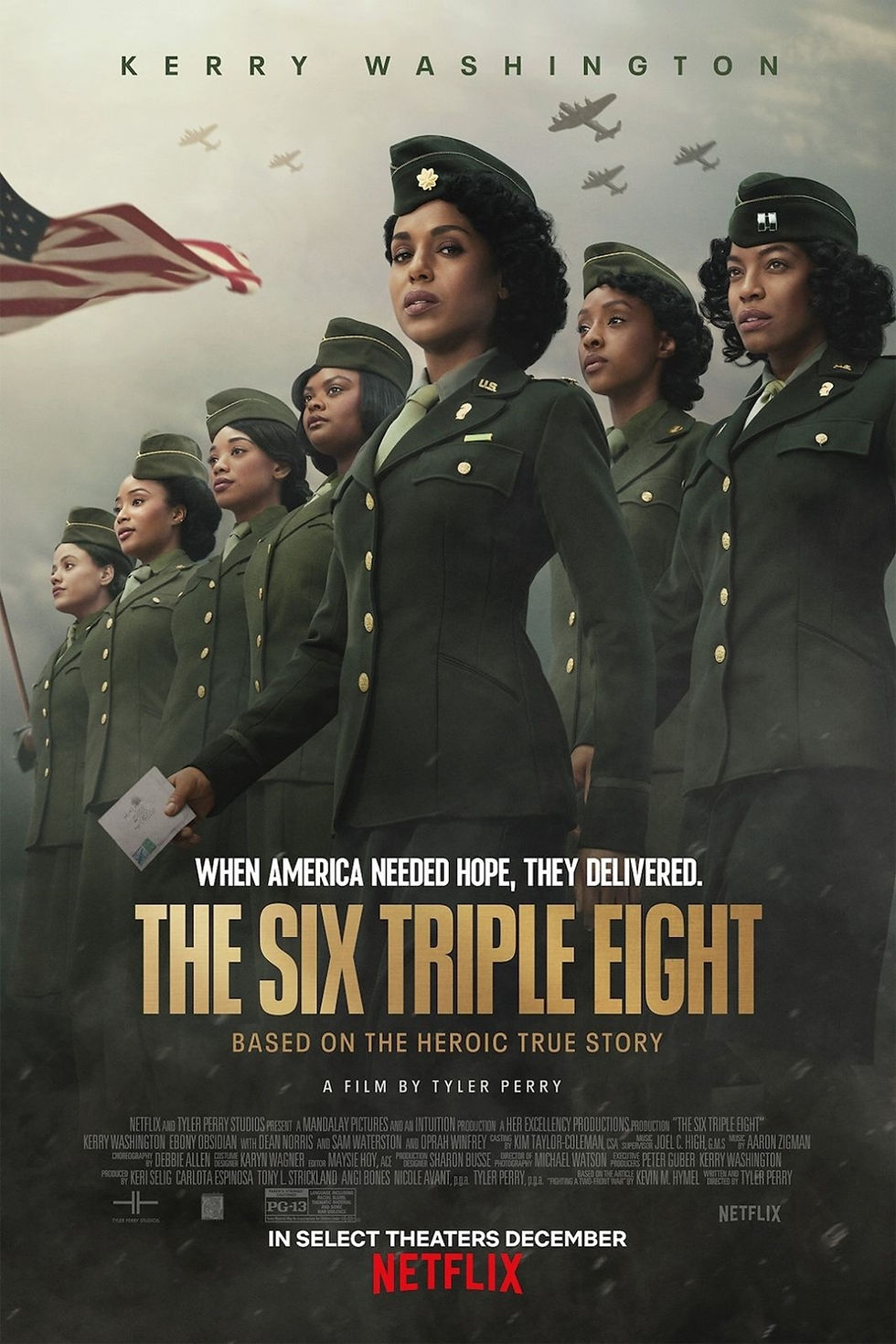The Exploration of Representation in “The Six Triple Eight”
- pitches3
- Feb 8, 2025
- 3 min read
Updated: Feb 10, 2025
By: Ayanna Hunter

In the past, I haven’t always valued the movies that Tyler Perry created. Specifically, I was against his creation and performance of the fictional character, Madea. Like many critics of his works, I thought that Madea was a harmful representation of Black women in mainstream media that aided racist stereotypes rather than helped to fight against them. However, “The Six Triple Eight”, the Netflix film written and directed by Perry in late December 2024 made me question these beliefs and reevaluate how I viewed representation entirely.
The historical war drama is based on the real accounts of the 6888th Central Postal Directory Battalion, the only all-Black and women of color Women’s Army Corps unit to serve in Europe during WWII. Their efforts helped American soldiers connect with their families. One of the film's central characters is Lena Derricot King (Ebony Obsidian), a recent high school graduate who is motivated to join the army after her best friend and lover dies while serving. However, she is quickly labeled as an underdog and faces challenges when forced to adjust from normal life in Pennsylvania to the rough training of the army.
In addition to the heavy weight of fighting for her country, she also bears the responsibility of representing Black women across the United States of America. This pressure is most felt by viewers through the introduction of Major Charity Adams, played by award winning actress Kerry Washington. Adams is firm, skilled, and demands perfection from her subordinates knowing that their abilities will be questioned by media outlets and by the other units of the army.
As predicted, the 6888 are continually regarded as incapable and inferior in the film by white male soldiers of the army, specifically character General Halt, (Dean Norris) who is known for his role on “Breaking Bad.” To make matters worse, they are nitpicked by journalists who wait purposefully to report their shortcomings during training. Still, Adams advocates for her and her subordinates to be respected, acknowledged, and given orders like the other units in the army.
Finally, they are tasked to sort 17 million pieces of mail in six months that would allow for communication between soldiers and their families. This was a task that other units in the army were not able to achieve and a task that was ordered to the 6888 with the expectation that they would fail. Despite this, Adams and the women of the 6888 take their mission extremely seriously. Due to their efficient communication, knowledge, and meticulous systems, they sort the mail in just 90 days.
Perry makes sure to emphasize the necessary work the 6888 did and the importance of telling the stories of our overlooked or unknown American heroes. Furthermore, Washington’s depiction of Major Charity Adams excellently encapsulates the frustration of doing everything correctly and still being perceived as less than for reasons outside of your control.
The film forces viewers to examine the relationship many of us have with perfection and the ways we restrict one another because we fall prey to the misconception that enough good behavior will earn exemption from racism. This is heavily evident toward the end of the film when the real Lena Derricot King voices that the 6888 were not acknowledged for their efforts in WWII.
What I did not realize prior to the film is that similar to the ways in which the 6888 felt the pressure of representing Black women, in my formative years I felt that pressure as well. The filmmakers and cast make the point that the idea that an individual person must represent millions of people every time they take an action is unfair and unrealistic. Therefore, perhaps we should give more grace to one another and the freedom to stand apart as individuals.
Yet, regardless of the various lessons viewers might have taken from “The Six Triple Eight”, the impact of the film is prominent as it attracted 52.4 million views within its first month of release. Perry does a great job of paying recognition to the heroes of the past that many were unaware of, ensuring that these women receive the acknowledgement they
have always deserved.





